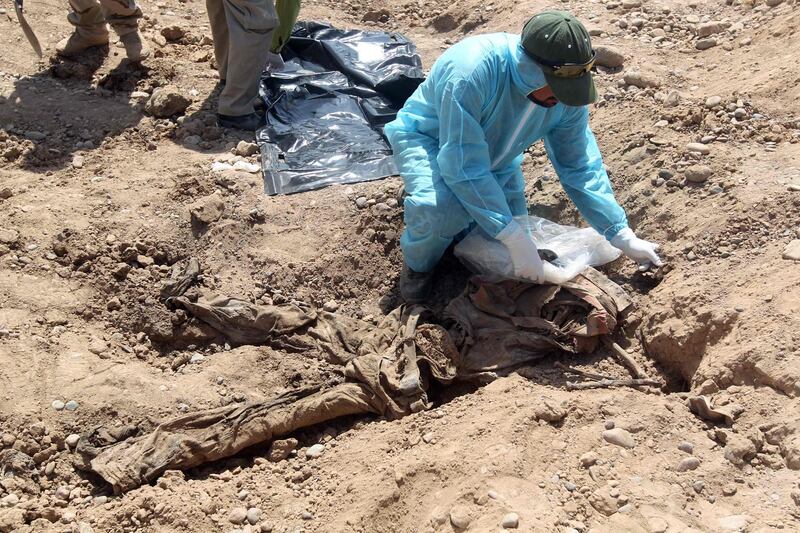Nearly a year after Iraq declared victory over ISIS, the UN says it has identified more than 200 mass graves in western and northern parts of the country.
The discovery could shed light on the fate of thousands who have gone missing since 2014 and deliver justice to the families of those killed.
Nearly half of the total sites are in Nineveh province, which contains the Khasfa sinkhole, believed to be the largest of the mass graves, according to a report published on Tuesday by The United Nations in Iraq and its human rights office.
The UN says as many as 4,000 people are believed to be buried in the site south of Mosul - the former ISIS capital in Iraq.
The remaining sites are distributed in the northern regions of Kirkuk, Salaheddin and Anbar, in the west.
The UN estimates that between 6,000 and 12,000 victims are buried in these sites, including women, children, elderly citizens and members of the Iraqi armed forces and police.
"The mass grave sites documented in our report are a testament to harrowing human loss, profound suffering and shocking cruelty," said the UN's representative in Iraq, Jan Kubis.
________
Read more:
Families of ISIL terrorism victims in Iraq still need closure
Families distraught after Indian government admits ISIL killed relatives
ISIL shoots civilians trying to flee Fallujah
Children among ISIL victims found in Palmyra mass grave
_________
Belkis Wille, senior Iraq researcher at Human Rights Watch told The National that recovering the bodies is critical to securing justice and accountability in Iraq after ISIS.
“During the battles against ISIS, we saw militants and Iraqi forces committing war crimes and crimes against humanity. These grave sites contain the best forensic evidence of these breaches,” Ms Wille said.
She said that recovering the bodies was also the only way to help determine the fate of thousands of people who went missing.
“Thousands of families across Iraq have missing family members, some are presumed dead, but their relatives hold on to hopes that they may still be held by ISIS in other countries such as Syria. Exhumations is the only way to give them closure,” Ms Wille said.
The UN says that out of the hundreds of sites, only 28 mass graves have been excavated and the remains of 1,258 bodies have been exhumed by the Mass Graves Directorate.
Ms Wille said that some of the unearthed sites had only been partially investigated.
“We have reason to believe there may be more bodies buried in the ground," she said.
She said that recovering the bodies was not always done in a systematic manner that is compliant with international standards, which compromises their value as evidence and undermines attempts to use them to ensure justice and accountability.
The Iraqi government body with the responsibility of preserving mass graves says it is underfunded and understaffed, and cannot adequately protect and investigate the sites, which are still littered with unexploded ordinance.
ISIS overran large areas of Iraq in 2014, terrorising residents and executing fighters and civilians en masse. The UN has said that almost 33,000 civilians were killed by the group in Iraq, with more than 55,000 injured.
The militants also targeted members of ethnic and religious minorities, including Yazidis, 3,000 of whom are still missing.
Murad Ismael, executive director and co-founder of Yazda, a non-profit organisation that documents mass graves, said there was a chance that digging up these sites would allow for the identification of some of the missing Yazidis.
But Mr Ismael said he suspected that most of those missing were not buried in mass graves, but might still be held by the group in other countries.
UN investigators in August began collecting evidence on war crimes, crimes against humanity, or genocide for Iraqi courts to use in trials of accused ISIS militants.
But Ms Wille said they had not used evidence contained in mass graves in their prosecution.






